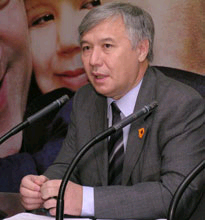
UKRAINE’S PRIME MINISTER: QUIET MAN IN, FIERY LADY OUT
Publication: Eurasia Daily Monitor Volume: 2 Issue: 178
By:

In the person of Yuriy Yekhanurov, who Ukraine’s parliament approved as new prime minister on September 22, President Viktor Yushchenko has acquired a quiet professional who should run the economy while Yushchenko will tackle constitutional reform and next year’s parliamentary race. Yekhanurov shares Yushchenko’s vision of Ukraine as a free market economy, unlike his predecessor Yulia Tymoshenko, who preferred government interference. Yekhanurov has considerable experience as a government official managing economic transition. In contrast, Tymoshenko came to opposition politics after running, in the mid-1990s, a regional fuel monopoly that enjoyed preferences at the top — Unified Energy Systems of Ukraine — so she had no real experience of working under market conditions. They will continue to play different roles in the months ahead, with Yekhanurov trying to help Yushchenko find a way out of economic stagnation; and Tymoshenko trying to torpedo his party’s election campaign as the leader of a rival bloc.
Yekhanurov has played secondary roles in party politics. In the mid-1990s he joined the main pro-government party at the time, the People’s Democratic Party (NDP). He was elected to parliament for the first time in 1998 not on the party ticket, but from a single-seat constituency in Zhytomyr. His first stint in parliament lasted less than two years, as in early 2000 then prime minister Yushchenko plucked him from parliament and named him his first deputy. Yekhanurov left the NDP the same year. He returned to party politics in late 2001, as deputy head of the election headquarters of Yushchenko’s Our Ukraine bloc. The bloc won the polls in March 2002, and Yekhanurov was elected to parliament on its list. The summer of 2004 again saw Yekhanurov as deputy head of Yushchenko’s campaign, this time the victorious presidential one. In March 2005 Yekhanurov took the number two slot — head of the central executive committee — in Yushchenko’s newly formed People’s Union-Our Ukraine party.
Yekhanurov’s record as an economic manager has been impressive. He became director of a construction materials factory in Soviet Ukraine at the age of 26 (he is 57 now), and then worked in top positions in Kyiv city hall. When Ukraine gained independence in 1991, he came to the Cabinet of Ministers, where he headed an economic department. In 1993 Yekhanurov became deputy economics minister, and in 1994-97 he steered the early stage of Ukraine’s privatization as chief of the State Property Fund. Unlike his Russian counterpart Anatoly Chubais, who was demonized as the “father” of voucher privatization in his country, Yekhanurov managed to conduct Ukraine’s privatization without scandals. He served a brief stint as economics minister in 1997, and then tackled problems of private enterprises first as head of a relevant government committee, then on the economic committee in parliament. In 2000-2001 Yekhanurov was first deputy prime minister, and in 2001-2002 he was then president Leonid Kuchma’s commissioner for administrative reform (he has preserved warm relations with Kuchma, despite belonging to Yushchenko’s camp). Yekhanurov’s most recent job was governor of Dnipropetrovsk Region since April 2005.
Yekhanurov has already promised a review of Tymoshenko’s revolutionary re-privatization decisions, favoring amicable out-of-court deals with the tycoons who bought large chunks of industry for cheap and not quite legally under Kuchma. Yushchenko has instructed Yekhanurov to pay his first visit as prime minister to Russia, to settle natural gas trade problems. This is something that Tymoshenko had planned, but never accomplished, probably for fear of detention on a bribery case dating back to her time at the helm of Ukraine’s Unified Energy Systems, in which Russian Defense Ministry official were involved.
For now, Tymoshenko is planning to travel around Ukraine. In a recent interview, she told Ukrayinska pravda that she is about to launch an election campaign tour across Ukraine’s regions: “Nobody will see me in Kyiv until the polls,” she declared. Tymoshenko said she would not take into her “mega-bloc” for the polls “the businessmen” from Yushchenko’s entourage, who she earlier accused of corruption. Another revelation that she made in the same interview was that she knew “since childhood” that she would one day be “the country’s leader.” The opposition United Social Democrats may become her allies in the fight for power. Their leader, the former head of the presidential administration under Kuchma, Viktor Medvedchuk, has offered to cooperate with her on several occasions. Interestingly, the latest issue of the Kyiv-based weekly 2000, which is believed to be linked to Medvedchuk, came out full of features and interviews lauding Tymoshenko.
Following Yekhanurov’s appointment, Ukrainian media have been comparing the income declarations Yekhanurov and Tymoshenko made for 2004. The differences between the two reflect not different lifestyles, as both are affluent according to Ukrainian standards, but rather a lack of openness on the part of Tymoshenko. Yekhanurov declared an income of over $30,000, a mid-size apartment in downtown Kyiv, a land plot, and a Toyota SUV. Tymoshenko declared an income of some $12,000, a tiny studio apartment in Dnipropetrovsk, and no vehicles.
(Ukrayinska pravda, September 20, 22; Channel 5, September 22; 2000, Interfax-Ukraine September 23; Komsomolskaya pravda v Ukraine, September 24)



